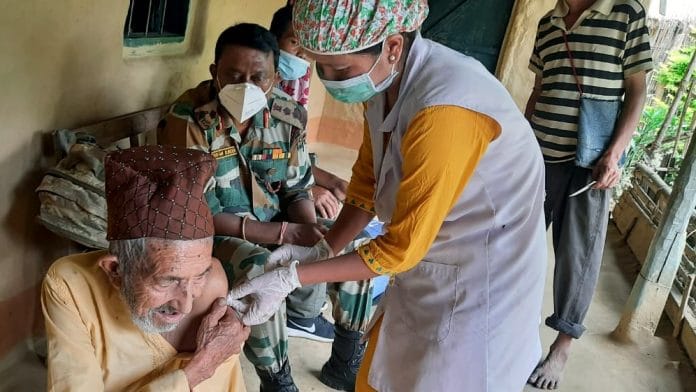New Delhi: Five days after it suggested that fully vaccinated people above the age of 40 years be given a booster dose against Covid-19, a consortium of labs that monitors genomic variations in the SARS-CoV-2, has taken a U-turn. In its latest bulletin, the Indian SARS-CoV-2 Genomics Consortium (INSACOG) has said that its earlier statement “was not a recommendation or suggestion for booster dose in the national immunisation program”.
INSACOG’s latest statement, released as part of its weekly bulletin on 4 December, parrots the government’s recent stance, that booster doses need much more scientific scrutiny before they are administered.
“Immunity and protection from SARS-CoV-2 is multifactorial with several unknown factors and further compounded by emerging Variants of Concern (VOCs). Many more scientific experiments are needed to assess the impacts of booster dose, which are being guided and monitored by the National Technical Advisory Group on Immunisation in India (NTAGI) and National Expert Group on Vaccine Administration for Covid-19 (NEGVAC),” said the INSACOG in its statement, adding that decisions regarding vaccinations come under the “expressed mandate” of the NTAGI and NEGVAC.
On 29 November, the INSACOG had said that low levels of neutralising antibodies from vaccines were unlikely to be sufficient to neutralise the Omicron variant. In light of this, it said, “Vaccination of all remaining unvaccinated at-risk people and consideration of a booster dose for those 40 years of age and over, first targeting the most high-risk/high-exposure, may be considered.”
In India, twelve cases of the Omicron variant — eight in Maharashtra, two in Karnataka and one each in Gujarat and Delhi — have been detected so far. Seven of the eight cases in Maharashtra were detected on Sunday — six in Pimpri-Chinchwad municipal area, and one in Pune. Of the patients in Pimpri-Chinchwad, three came from Nigeria while the rest are their close contacts. Three of the six are under 18, and hence had not taken any vaccine. The Pune patient was detected through “routine surveillance”, and had recently visited Finland. Delhi too recorded its first case on Sunday.
The NTAGI is slated to hold a meeting on Monday where the issue of administering the ‘additional’ dose of Covid vaccine to immunocompromised individuals will be deliberated upon.
Also Read: Delhi reports first case of Omicron variant
Govt stand on booster doses
The INSACOG is a network of 28 laboratories. It is a joint initiative of the Union Health and Family Welfare Ministry, Department of Biotechnology, Council for Scientific & Industrial Research and the Indian Council of Medical Research (ICMR), but is not an advisory body.
The consortium’s clarification on booster doses comes after the government expressly stated in Parliament that it would take a decision based on the recommendations of the NTAGI and NEGVAC.
On 3 December, Union Minister of Health and Family Welfare Mansukh Mandaviya had said, “Our experts will take a final decision on the question of vaccinating children and giving booster doses (to the adult population). Based on their recommendation, the government will move forward. This is my clear reply on the floor of Parliament.”
(Edited by Gitanjali Das)
Also Read: The Omicron variant is dominating the headlines. World leaders start preparing






